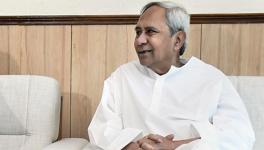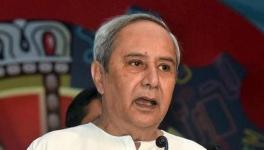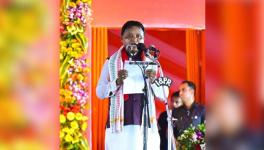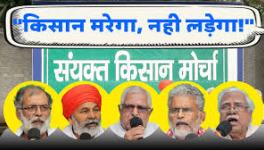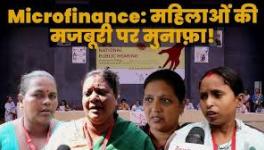Patnaik’s Decision to Extend Lockdown Defends Right to Life
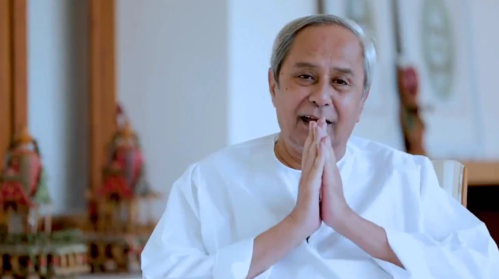
Image Courtesy: Twitter
The state of Odisha, under the leadership of Chief Minister Naveen Patnaik, has been widely acclaimed for setting excellent benchmarks of governance in disaster management and ensuring almost zero human casualty. It also has many firsts to its credit for taking pioneering measures in its struggle against the COVID-19 disease. Today, it has become the first state in India to have extended the three-week lockdown period from March 25 to April 14, till April 30. It has requested the Government of India to do so for the whole nation.
State Took Lead in Declaring COVID-19 a Disaster
On March 13, the Union government had declared that there was no health emergency in the country because of coronavirus. On the same day, the Odisha government declared COVID-19 a disaster under the provisions of the National Disaster Management Act 2005, two days before the first COVID-19 positive case was reported in the state.
In the afternoon of March 13, Patnaik made a historic statement in the State Assembly where he, for the first time, advocated the ruthless practice of social distancing to protect people from the infection, forcefully stating that: "This extraordinary circumstance calls for an extraordinary response."
This demonstrates the preparedness and maturity of the state leadership in the wake of the terrible disaster caused by the virus. Patnaik’s strong advocacy of social distancing to contain the spread of the disease was combined with invocation of powers under the Epidemic Diseases Act, 1897 and the Code of Criminal Procedure, 1973, to address the challenge posed by COVID-19.
The chief minister said: "Very few times in the history of the world have human beings as a race faced challenges beyond their comprehension" and underlined the point that "in the absence of any vaccine or treatment …our collective responsibility is the only hope we have, to fight this epidemic".
It was only after Patnaik strongly advocated social distancing as a preventive measure to protect people from getting infected by the coronavirus, that the phrase of social distancing gained currency across the country and other leaders at the national and state level extensively invoked it as an effective, non-pharmaceutical recipe to reverse and stop COVID-19’s spread across the country.
Action Plan, Helpline, Incentivising Home Quarantine
In the first week of March itself, the Odisha government devised an action plan to deal with COVID-19. A separate helpline number was provided and was widely transmitted to people so that they could dial and register their names. It received hundreds and thousands of calls that enabled the state government to reach out to people and provide necessary help.
A dedicated website, covid19.odisha.gov.in, launched by the state government on March 3, preceded the launching of the national portal by the Centre. It was made mandatory for all those coming to Odisha to register themselves on the portal and the chief minister also registered his sister, Geeta Mehta's, name on her visit to the state.
The state government declared that those coming from abroad to Odisha would have to be quarantined for 14 days and each such person would be paid Rs 15,000 for strictly implementing the government guidelines. Such incentivisation of quarantine helped the state government attract more than 4,000 people to avail of the opportunities.
In an article "This is how Odisha Quarantined me after I Returned from Harvard: Other States Should Learn", published in theprint.in, the writer Rangin Tripathy wrote that " This data-driven approach of the Odisha government contrasts sharply with that of the central government, which announced a nation-wide lockdown with four hours of notice without necessarily thinking through it. The Odisha government showed a willingness to not go for uniformity as a convenient tool and was driven by a rational assessment of the situation because it had data on which it could base its decisions."
The author also observed that "Flattening the proverbial curve has been challenging for most countries around the world. Trying to keep ahead of it may save more lives and in systematically monitoring home quarantine, Odisha is leading by example."
Extension of Lockdown Defends Right to Life
The decision of the Odisha government to extend the lockdown till April 30, is bold, daring and hard. At the same time, it is a trend-setter for the whole country. The video message of Patnaik dated April 9, 2020, informing people of the state about the decision to extend the lockdown till April 30, noted the grave menace posed by COVID-19 and succinctly summed up by observing: "Coronavirus is the biggest threat that the human race has faced in more than a century ".
Odisha’s decision for extension of lockdown must have been taken with a heavy heart, keeping in mind the overwhelming precedence of people's right to life and health over all other rights. In fact, the CM’s video message juxtaposed the spread of COVID-19 in Odisha with that of the frightening scenario in the US and observed with a great deal of anxiety, "From March 15th when we had the first case, till today at 42 cases......the USA - a Superpower- in the same period has moved from 3,000 to 4 lakh cases". He then noted that "The United States has lost more people to COVID-19 than all the wars and the 9/11 attack put together. They have still not locked down the country as a whole."
Deeply mindful of the paralysing impact of the pandemic on the sole superpower of 21st century world order, Patnaik conveyed his hard decision to extend the lockdown to the people, demonstrating a great amount understanding: "At this crucial juncture, one has to decide between protecting lives of people and economic activity" and " the State Cabinet which met today, decided that saving the lives of our people is the top most priority at this juncture".
Former President of India, late K R Narayanan, in one of his sensitive articulations on the rainbow of rights for promoting human and health security, had insightfully said that all rights enjoyed by human beings flow from the right to life. In extending the lock down till April 30, the government of Odisha is according precedence to right to life, which is the foundation of all other rights of people. So, the larger purpose of extended lockdown period is to protect the rainbow of in defence of human and health security.
It is instructive to note that Patnaik has allotted Rs 54 lakh from a relief fund to feed community animals in five municipal corporations and all 48 municipalities of Odisha during the COVID-19 lockdown. The People for Ethical Treatment of Animals (PETA), in recognition of his contributions to look after animals in these distressing times, honoured him with ‘Hero to Animals’ Award.
Odisha Government Stands to Defend Our Nationhood
India’s first Prime Minister, Pandit Jawaharlal Nehru, in his famous ‘Tryst with Destiny’ speech prophetically noted that "Peace has been said to be indivisible; so is freedom, so is prosperity now, and so also is disaster in this one world that can no longer be split into isolated fragments." In 1950, in a letter to Chief Ministers, Nehru insightfully wrote: "Indeed, every calamity is a challenge to our nationhood …and a nation is ultimately judged by the way this challenge is accepted".
The government of Odisha, through its manifold measures, has demonstrated its preparedness to face the challenge posed by COVID- 19 and defend our nationhood. Some of the crucial measures taken are allocation of Rs 225 crore to fight the coronavirus, food security for the poor and deprived people, setting up of several COVID-19 hospitals, opening quarantine centres right from panchayat to state-level and involving women self-help groups in making masks, generating awareness among people on preventive measures and providing ration and vegetables to people and supplying free food to under-privileged sections of society.
The state government is also providing mid-day meals to children of closed schools and old age pension for three months as advance payment to the beneficiaries.
Odisha was one of the first states to declare a complete lockdown in five districts and some towns where people came from abroad and which were vulnerable to the spread of COVID-19. This was done way before the 21-day lockdown of the country was announced from March 24, by the Prime Minister of India.
Free tests free and availability of protective and critical equipment
Odisha is the only state that is providing three months’ salary to state government doctors and healthcare professionals who are in the frontline of the fight against COVID-19. During the video conference of CMs with the Prime Minister, Patnaik suggested providing extensive facilities for free testing of COVID-19 cases in both public and private institutions.
Today, Patnaik stands vindicated by the order of the Supreme Court dated April 8, that all COVID-19 tests must be made free both in public and private institutions. The Odisha CM also assured the people of the state that no stone was being left unturned in scaling up COVID testing and treatment facilities and the government was geared to do one lakh rapid tests in the state in the earliest possible time .
The Odisha chief minister also pleaded with the Prime Minister that protective gear, critical care equipment and masks for healthcare personnel must be available to deal with the menace of coronavirus. This suggestion is evocative of observations made in an article in the Economist wherein it was said that “The real limiting factors are likely to be the ventilators or the staff” in the event of a huge surge of coronavirus cases.
Even an advanced nation like the US does not have adequate ventilators that will enable patients in serious conditions to breathe mechanically, while in India’s case, with only a few lakh beds in intensive care units, it would be an insurmountable problem if hundreds and thousands of patients rush to hospitals at the peak hour of the infection. India hardly has a few thousand doctors trained in critical care medicine and the number of specialised nurses and assistants is abysmally low.
Ramanan Laxminarayan, Director of the Washington-based Centre for Disease Dynamics, had cautioned the Union government much earlier that the number of patients infected with the coronavirus in India had gone up manifold because the infection was now spreading through the community. He advised that the government prepare for providing ICU facilities for four to eight million patients who would require ventilators and a range of critical care medicines that are not adequately available in our country.
Patnaik’s suggestion in this regard is in consonance with the advice proffered at the global level by experts. In doing so, the Odisha CM has set a global benchmark not just in governance but also in dealing with recurrent natural disasters that have affected the state.
Economic Assistance Package
Patnaik has also made significant suggestions for the economic empowerment of underprivileged sections of society to alleviate the adverse financial impact caused by the lockdown. The slew of measures he had suggested would give at least 50 days wages to MGNREGA (rural job guarantee scheme) workers, financial support for families covered under National Food Security Act, economic packages for various sectors and construction workers and additional instalments to farmers under the PM Kisan scheme.
He also made a vital point that the Centre should distribute funds in advance to the states to enable them to effectively handle the gathering crises. Such measures, when implemented by the Union government, would, in fact, go a long way in fulfilling the objectives which are at the core of cooperative federalism.
Measures to Meet the Extended Lockdown
The way in which the Odisha government would face the extended lockdown period was spelt out by Patnaik who said that "Activities related to agriculture, animal husbandry and MGNREGS will be facilitated during the lockdown period following social distancing norms". Completely mindful of the food security of the people, the state government has taken measures to ensure transportation of essential goods and material so that people do not face shortage and deficiency of the basic necessities.
The closure of educational institutions has been extended till June 17. In addition, the state government has requested the Union government not to commence airline and railway services till April 30.
Wuhan Model Invoked
Declaring the lockdown of five districts and some towns of the state on March 21, the CM himself acknowledged that if the Wuhan province of China could succeed in completely checking the spread of coronavirus by completely locking down the province and adopting aggressive social distancing measures, the same model was being adopted for the state.
Non-Pharma Preventive Measures
It is sincerely hoped that the non-pharmaceutical and preventive measures adopted by the Odisha government, such as social distancing, protocol of hand washing with soaps, eschewing the practice of spitting in public spaces and lockdown and shutdown of almost all human activities will eventually liberate people from this highly infectious virus.
Patnaik, while interacting with doctors and healthcare personnel of the recently set up two COVID-19 hospitals, through video conferencing very rightly said: "Although we are ready to provide better healthcare to COVID-19 patients in these standalone hospitals, we can win the fight through social distancing, hand washing and observing lockdown guidelines wholeheartedly.”
Hence, the trend-setting extended lockdown for entire Odisha till April 30, would be an effective measure to defend the right to life and health of people.
The writer served as Officer on Special Duty and Press Secretary to Former President of India, late K R Narayanan. The views are personal.
Get the latest reports & analysis with people's perspective on Protests, movements & deep analytical videos, discussions of the current affairs in your Telegram app. Subscribe to NewsClick's Telegram channel & get Real-Time updates on stories, as they get published on our website.











